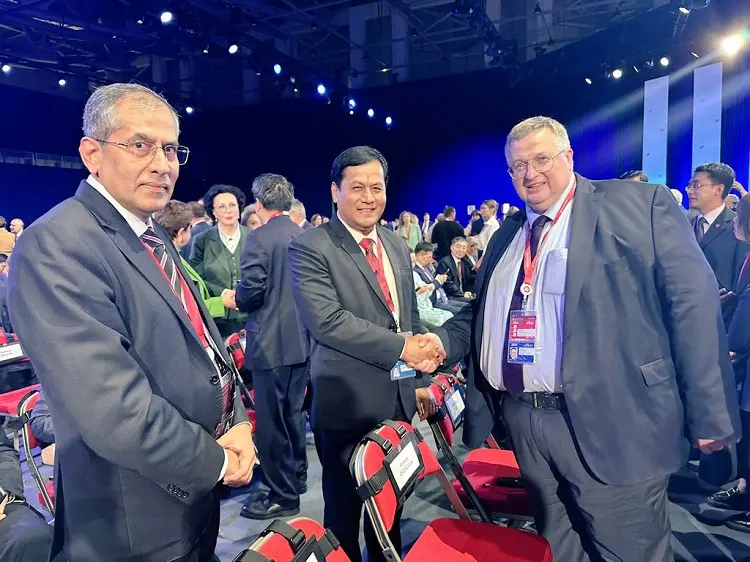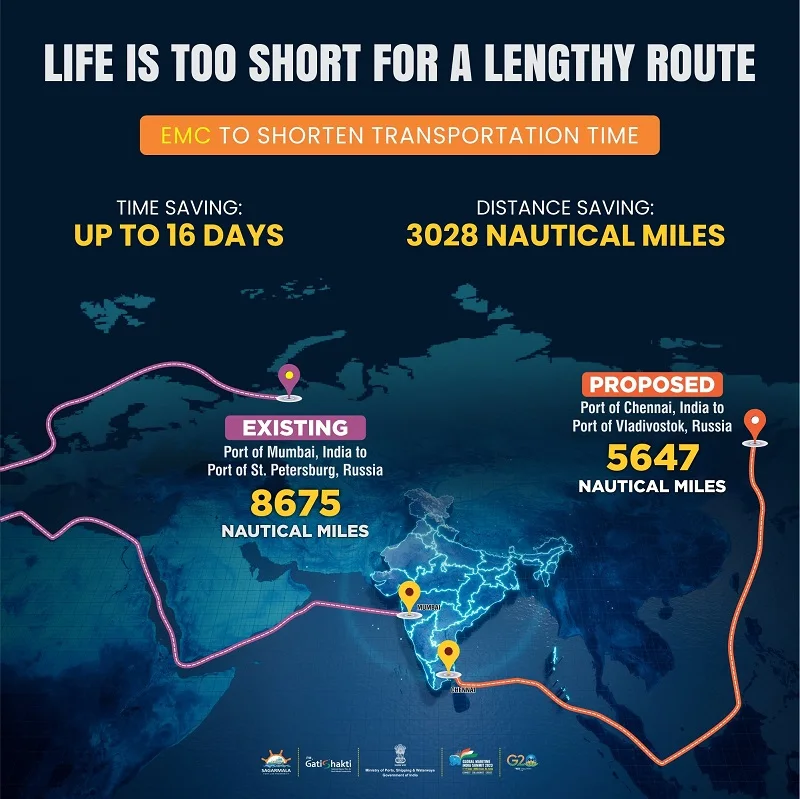

Union Minister for Ports, Shipping, and Waterways, Sarbananda Sonowal with Russian Deputy Prime Minister Alexei Overchuk. Also seen is Pavan Kapoor, Ambassador of India to Russia (Image courtesy: Twitter/@sarbanandsonwal)
A large Russian delegation will be visiting Chennai next month as India and Russia step up early operationalisation of new transport corridors like the Northern Sea Route (NSR) and the Eastern Maritime Corridor (EMC) between Vladivostok and Chennai.
The Russian touring party for an Indo-Russian Workshop on EMC scheduled to begin in Chennai from October 30 will not only include top government officials from the Russian Far East and the Arctic region but also leading exporters of the country.
New Delhi has also extended an invitation to Moscow to participate at the upcoming Global Maritime India Summit (GMIS) slated for October 17-19 at New Delhi’s Pragati Maidan.
The Russian delegation’s attendance at New Delhi and Chennai events is expected to give a massive fillip to efforts from both the sides in expanding and diversifying bilateral trade and economic cooperation using alternative maritime routes.
Last week, while representing India at the Eastern Economic Forum in Vladivostok, Union Minister for Ports, Shipping, and Waterways, Sarbananda Sonowal held detailed talks with Alexey Chekunkov, Minister for the Development of the Russian Far East and Arctic, on full-scale operationalisation of the Eastern Maritime Corridor.


According to Sonowal’s office, both countries also agreed on training of Indian seafarers in Polar and Arctic waters at the Russian Maritime Training Institute, named after GI Admiral Nevelsky, which is equipped with simulator training facilities, in Vladivostok.
Spotlighting that India’s relationship with Russia has deep historical roots and is based on mutual respect and shared interests, the minister mentioned that an Indian team’s visit to the ports of Vladivostok, Vostochny, Nakhodka and Kozmino in May has helped in gaining insights and understanding requirements for the full-scale launch of the EMC.
“Our proposed workshop in Chennai will discuss the operationalisation of the EMC, and we envision to involve pertinent stakeholders involved in the trading and transportation of potential commodities such as coking coal, oil, and liquefied natural gas along this corridor,” said Sonowal.
Chekunkov too asserted that cooperation with India is one of the priorities of the international activities of his ministry which intends to develop relations with Indian partners in all areas of mutual interest in the Far East.
“We agree that the potential cargo base of the line will be coking coal, oil, LNG and fertilizers. In the Far East, this product range is present in sufficient quantities, and in the east of India, the infrastructure to receive it is being built up. Taking into account the specialization of the Far Eastern ports, the project should be implemented in an expanded geographical scope, including other regions in addition to Primorye, primarily the Khabarovsk Territory,” he said.
The development of the “global transport project” Northern Sea Route, he added, can provide economic benefits to both Russia and non-regional states and gives India an opportunity to increase sales of shipbuilding products and gain income from participation in the general logistics business in northern latitudes.
India is also exploring possibilities of establishing a trans-shipment hub in the Bay of Bengal.
Aimed at reducing cargo transit times between India and Russia, the Eastern Maritime Corridor holds immense potential to unlock new opportunities for trade and cooperation between the two countries.
It is expected to reduce the time required to transport cargo between Indian and Russian ports of Far-East region from 40 days currently to 24 in future.
The present trade route between Mumbai in India and Saint Petersburg in Russia covers a distance of 8,675 nautical miles which takes approximately 35 to 40 days.
The Chennai-Vladivostok sea route (EMC) will be covering a distance of about 5,600 nautical miles. A large container ship which travels at the normal cruising speed of 20-25 knots (37-46 km/hour), will be able to cover this distance in approximately 10 to 12 days.
As reported by IndiaNarrative.com extensively, the container turnover between India and Russia has been growing gradually over the past few years.
In March, External Affairs Minister S Jaishankar spotlighted the development of transport corridors along the India-Russia route and container traffic between Indian and Russian Far Eastern ports during the visit of Alexei Chekunkov, Russia’s Minister for the Development of the Far East and the Arctic, to New Delhi and Mumbai.
The EAM spoke on the importance of connectivity initiatives, including the International North-South Transport Corridor (INSTC) as well as the Eastern Maritime Corridor (Chennai-Vladivostok Corridor) that India believes would play a key role in expanding and diversifying the bilateral trade and economic cooperation.
“The Eastern Maritime Corridor, I think, fits in with our goal, what is called ‘Act East Policy’, as well as the Russian policy of having the Far East come in as an additional driver of the economy. So, I think there is a synergy there which is waiting to be tapped,” said Jaishankar.
The Far East Region is 40% of the territory of Russia, has almost half of the country’s forests and gold reserves, more than 70% of fish, diamonds, over 30% of titanium, copper and operates some of the most important strategic enterprises, seaports and railways.
“In a word, the role of the Far East for our country, for its future, for Russia’s position in a multipolar world is exceptionally great. We understand this well. And therefore I want to repeat what I said in my address to the Federal Assembly 10 years ago, in December 2013, and what I said at the very beginning: the rapid development of the Far East is our absolute priority for the entire 21st century,” said Russian President Vladimir Putin at the plenary session of this year’s Eastern Economic Forum.
Also Read: Rising India set to access new shipping route from Belarus via Russia
Former Member of Parliament of Canada, Chandra Arya, has said it would be his pleasure…
UK Foreign Secretary David Lammy will meet with Prime Minister Narendra Modi on his second…
Gujarat Health Minister Rushikesh Patel on Saturday noted that the state is fully prepared for…
Canadian Prime Minister Mark Carney on Friday (local time) said that G7 countries will hold…
Taiwan's Ministry of National Defence detected 34 sorties of Chinese aircraft, eight Chinese naval vessels…
By Ravi Khandelwal Canada needs to have a better relationship with India and move forward…